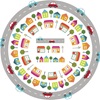Note: This article is excerpted from The Cost of Community.
"Blessed are the merciful, for they will be shown mercy."—Matthew 5:7
While mercy and grace are not to be confused, neither should they be considered entirely disconnected from each other. Grace is the unmerited gift of God to forgive us our sins. Mercy is the compassionate response to the suffering that sin has caused. When we are merciful, it is only because we have received grace, for apart from grace, mercy is empty and without hope, a futile attempt to sweep back the ocean's tide with only a broom. This is critical to understand, for like Francis of Assisi, when we live in mercy and compassion, when we make choices to show mercy and generosity to others, it points to the hope found in God's grace. It is not about us but about Christ.
Caring vs. Confronting
Following as it does after the admonition to hunger for justice, the beatitude in Matthew 5:7 also makes clear that doing justice has more to do with caring for the suffering than it does confronting the sources of injustice. Both are important and without question mandated in Scripture as the responsibility of God's people. Yet Jesus is clearly placing an emphasis on mercy in respect to justice, bringing to mind the powerful prophetic mandate found in Micah 6:8, to "act justly and to love mercy and to walk humbly with your God." Why would he make that distinction? Is Jesus downplaying the need for the prophetic confrontation of injustice?
Having lived in my inner-city neighborhood for quite a while, I am very aware of the systemic injustices that are ever present on our streets. Therefore, it is also a community that knows its fair share of activists. Most of these activists are well-intentioned, passionate people for whom I have the greatest respect. However, in talking to the more seasoned and mature among them, I have heard a common refrain: The danger of long-term activism can too often result in defining life by the brokenness of the world, by what the activist is against. Many of them say they struggle with dark thoughts and cynicism. Some secretly wonder if any good will come of their hard work.
I believe that direct confrontation with systems of injustice is important, with activism playing a part. The role of the prophetic voice has always been critical in confronting God's people and the wider society with their compromise and corruption, calling them to active, reparative repentance.
Turning Care into Action
While never denying the need for such prophetic voices, Jesus places an emphasis on expressions of justice that worked themselves out in active compassion and mercy to those in need. In James 4:17 we are reminded, "If anyone, then, knows the good they ought to do and doesn't do it, it is sin for them." In the same way, the greatest weapons against injustice are acts of justice, mercy, and compassion. It is not enough to know what is good and right and just; we must also act accordingly. Nor is it enough to simply be against that which is bad and wrong and unjust. As important as it is to confront injustice, our primary means of defeating it is by actively living in the opposite spirit of those who seek to destroy.
Further, by recognizing we are as much in need of mercy (and grace) as those we extend mercy to, we subvert the tendency we all have for coming to the rescue as the saviors of the lost and needy. We have one Savior, on whom we all absolutely and equally depend.
This point was made beautifully in a story I heard from my wife's homeland, Australia. In response to some critical concerns facing an Aboriginal community in Queensland, the government sent a group of social workers and professionals to assess and respond to the problems. However, when they arrived, they were met at the entrance to the community by a group of local people, among them artist and activist Lilla Watson. The story goes that on behalf of her community, Watson stepped forward and made the following statement: "If you have come here to help me, you are wasting your time. But if you have come because your liberation is bound up with mine, then let us work together."
To God Be the Glory
In a culture that can make heroes out of people who champion the cause of the poor, we must remember that this truth about our mutuality of brokenness is critical. The temptation to take God's glory for ourselves is as old as the Garden of Eden. One way of discovering the seeds of this temptation in our hearts is to examine who we are and are not willing to extend mercy to.
While my neighborhood is largely filled with wonderful, hard-working people, there is also a very present and visible minority who are known and feared, and even despised by many. Drug dealers, pimps, gang members, and prostitutes are not abstract concepts or Hollywood characters on my block. They are my neighbors. Do I truly believe that I deserve mercy and grace no more than they do? Only when we truly answer this question will we be able to move toward understanding that the mercy we extend to others is given regardless of merit, because the grace and mercy we receive is equally undeserved.
—Jamie Arpin-Ricci leads Little Flower community in Winnipeg, Manitoba, and is part of an Anglican lay order in the Franciscan tradition. Taken from The Cost of Community; copyright 2011 by Jamie Arpin-Ricci. Used by permission of InterVarsity Press.










